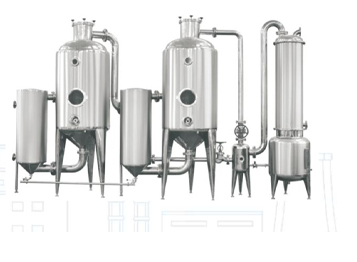In the context of the increasingly severe environmental protection situation nowadays, wastewater treatment has become a crucial part of environmental protection. Evaporation equipment plays an extremely important role in wastewater treatment, providing effective technical means to solve the problem of water pollution.

I. Wastewater Concentration and Volume Reduction
(I) Efficient Separation of Water
Evaporation equipment separates water from other substances by heating the wastewater to vaporize the water into steam. During this process, a large amount of water can be removed from the wastewater, achieving wastewater concentration. For example, for the high-salt wastewater generated in some industrial production processes, evaporation equipment can evaporate the water in it, so that salts and other impurities are enriched in the remaining concentrated liquid. In this way, the originally large volume of wastewater is significantly reduced, greatly reducing the load and cost of subsequent treatment.
(II) Potential for Resource Recovery
After the wastewater is concentrated by evaporation, some valuable substances in it can be further recovered and reused. For instance, the wastewater in some metal processing industries contains metal ions. Through evaporation and concentration, metal ions can be extracted by specific processes to realize resource recovery. This is not only beneficial to environmental protection but also can bring certain economic benefits to enterprises, improve the utilization rate of resources, and conform to the concept of sustainable development.
II. Pollutant Removal and Water Quality Purification
(I) Removal of Volatile Pollutants
Some volatile organic pollutants or odor-causing substances will volatilize along with the steam during the evaporation process. Through appropriate condensation and subsequent treatment, these volatile pollutants can be separated from the wastewater, effectively reducing the pollution degree of the wastewater. For example, for the wastewater containing volatile organic solvents, during the operation of evaporation equipment, the organic solvents will first volatilize and then be recovered through condensation or further treated, thus purifying the wastewater.
(II) Separation of Refractory Substances
For substances in wastewater that are difficult to biodegrade, such as some high-molecular-weight organic substances or persistent organic pollutants, evaporation equipment can separate them from water by leaving them in the concentrated liquid. This can avoid the interference and inhibition of these refractory substances on subsequent biological treatment processes and improve the treatment effect of the entire wastewater treatment system. Subsequently, other specialized treatment methods, such as incineration and chemical oxidation, can be adopted for the concentrated liquid to further reduce the harm of pollutants.
III. Adaptability to Various Types of Wastewater
(I) Treatment of High-Salt Wastewater
High-salt wastewater is a difficult problem faced by many industrial fields, and evaporation equipment has good treatment capabilities for it. Whether it is the concentrated brine generated in the process of seawater desalination or the high-salt wastewater discharged by industries such as chemical and pharmaceutical industries, evaporation equipment can gradually evaporate the water through technologies such as multi-effect evaporation and mechanical vapor recompression evaporation, so that salts crystallize and precipitate out, realizing the separation of salts and water, providing a reliable way for the proper treatment of high-salt wastewater.
(II) Treatment of Wastewater Containing Heavy Metals
In the treatment of wastewater containing heavy metals, evaporation equipment also plays an important role. Through evaporation and concentration, heavy metal ions will be enriched in the concentrated liquid. Then, combined with processes such as ion exchange and precipitation, heavy metals can be further removed or recovered from the concentrated liquid. This can prevent heavy metals from polluting water bodies and soil, and can also recover valuable metal resources, reducing environmental damage and resource waste.
(III) Treatment of Organic Wastewater
For organic wastewater, evaporation equipment can be used as a pretreatment or advanced treatment means. Some high-concentration organic wastewater is first concentrated by evaporation to reduce the content of organic substances and the volume of wastewater, and then undergoes biological treatment or other subsequent treatment processes, which can improve the treatment efficiency and reduce the treatment cost. In some cases, evaporation equipment can also be combined with other oxidation technologies to conduct in-depth purification of organic wastewater, so that the treated wastewater can meet higher discharge standards or reuse requirements.
IV. Cost and Energy Consumption Reduction in Treatment
(I) Energy Recovery and Utilization
Modern evaporation equipment adopts a variety of energy-saving technologies, such as mechanical vapor recompression (MVR) technology. This technology compresses the secondary steam generated during the evaporation process through a compressor, increases its temperature and pressure, and then uses it again as heating steam, greatly reducing the demand for external energy. Through this energy recovery and utilization mechanism, the energy consumption during the evaporation process can be significantly reduced, thereby reducing the overall cost of wastewater treatment.
(II) Optimization of Process Design
In terms of the process design of evaporation equipment, by reasonably selecting evaporation processes, determining the number of evaporation stages, and optimizing the equipment structure, the evaporation efficiency can be improved, and the equipment investment and operation costs can be reduced. For example, the multi-effect evaporation process uses the secondary steam generated in the previous effect as the heating source for the next effect, making full use of the latent heat of steam and reducing steam consumption. Meanwhile, according to the characteristics of wastewater and treatment requirements, selecting appropriate types of evaporators, such as falling film evaporators and rising film evaporators, can also reduce the operation cost and maintenance cost of the equipment while ensuring the treatment effect.
In conclusion, evaporation equipment plays an irreplaceable and key role in wastewater treatment in environmental protection projects. It can achieve wastewater concentration and volume reduction, pollutant removal and water quality purification, and adapt to various types of wastewater while reducing treatment costs and energy consumption.
GET A QUOTE